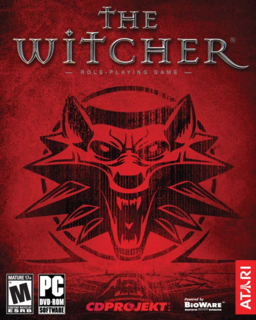Embrace the role of a demon slayer and choose to become a pawn or a player in a game of politics and seduction.
Though it doesn't tell you a lot in the first hours - the main character has lost his memory - it does a very good job of slowing presenting you the necessary information about the characters, societies and places you'll come in contact.
The game uses the Aurora engine (Neverwinter Nights) but it's so modified that it bears little resemblance to Bioware's RPG. I do enjoy the graphics, the settings feel alive and the character models are very detailed, specially up close. The environment is affected by the weather and there's a distinct morning, day, evening, night cycle. The weather also affects how people move on the streets and care about their jobs and so do the time cycle. I've read some complaints that the NPC models repeat a lot, which is true, but I don't think it's a problem since they're detailed and well designed.
You start the game with an apparently simple quest, to hunt the Salamandra, an organization that have recently raided the witchers' headquarters. From there, your search for answers brings you to a small village and the real game starts.
The Witcher is all about choices and that's the good part of playing a character with no memory. You get to decide what kind of role you'll play. Being a witcher means being an aberration, wicked, something normal folks only seek aid from when necessary. Most people will openly avoid being close to you, even when they need your services. You might get the sympathy of an equally discriminated group, the half humans, but it all depends on your play style.
This game delivers what most games only promise. The plot and the world really change depending on the choices you make. Will you ally with the nonhuman and smuggle weapons for a rebellion or will you raid their camp with the local militia ? Aid the beautiful sorceress in exchange for sexual favors and murder the peasants that threaten to kill her or aid the peasants and kill the witch ? Spare the life of a werewolf that swears he only hunts criminals or enforce the witcher's code and slay the beast ? The choices you make often mean some of the characters won't be found later in the game or define the reaction a given organization will have with you.
It's a mature game, no doubt about that. I don't mean it only because there's a lot of cursing and name calling, nor only because there are several women your character can have sexual intercourse, but also because the choices are far from black and white. More often than not, I found myself choosing the lesser of two evils.
Later on, even if you try to walk on the fence, the game starts to weave a web of political intrigue where your decisions gain weight not only in your lifestyle but impacts the city as well. Former allies and lovers start to display behaviors that give the impression that you might've been manipulated from the beginning and it gets harder and harder to trust someone.
Sadly, not everything is perfect. While some side quests are remarkable, there are also a lot of fetch quests that require extensive backtracking. Also, some of the best quests are given by characters that are only available during a specific time of the day and are easy to miss. I can't shake the feeling I might've been missing something great.
I enjoyed the combat system, the idea of brewing potions, elixirs and bombs to fight off monsters and magic being introduced by the use of seals but the real kick of this game comes from how detailed the world, the characters and the organizations are and shows that RPGs can and should have a mature theme.

